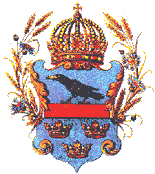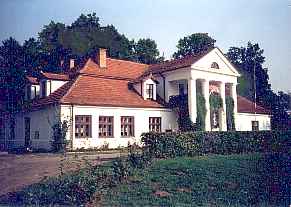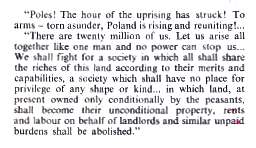Polish peasants and Austrian troops in Galicia exchanging booty for money.
| The Uprising: |
| The Austrians used a slightly different tactic of
letting the conspiracy be known to certain local peasants in Galicia. The
Austrians made it clear that they would be generous to peasants who led
pre-emptive uprisings against their local Polish nobles. Overall, the national insurrection had the greatest support amongst the general population in Krakow and its adjacent countryside. Volunteers from all segments of the population there joined the call to arms. However, the greater the distance from Krakow, the less support that was generated. Around Bochnia, the peasants and general population took a "wait-and-see" attitude. Around Tarnow, the general population was much less supportive and many peasants decided the Austrian idea of a pre-emptive attack on their Polish nobles, with the rewards it might bring, was worth the risks. |
| Dennis Benarz & Karen Wisniewski, USA 2002, 2003, 2009 |
 |
 |
| In 1845-46, Polish nobles in the various
partitions of Poland conspired to revolt against the occupying European
powers and restore a sovereign Polish state. The prime source of this
conspiracy was Krakow, an independent city-state created by Austria. The nationwide insurrection was to begin on 20 February 1846. However, news of the conspiracy reached Prussian and Russian officials and several arrests were made. Polish nobles in those areas withdrew their support for the revolt. |
| Korzienow Manor near Debica |
 |
| Ultimately, the insurrection ended in failure with Krakow being occupied by Russian troops and eventually made part of the Austrian-Hungarian Empire again. The pre-emptive attacks on local Polish nobles by some Polish peasants quite honestly makes the peasants look greedy, short-sighted, and unpatriotic. In all, 450 Galician manors were attacked, looted, damaged, and/or detroyed. Approximately 200 nobles and 800 officials were killed. It is a sad chapter in Polish history. |
| It is certainly true that the average peasant farmer in Galicia felt somewhat oppressed and abused by their local noblemen. What the peasants who took part in the uprising failed to realize is that the noble-led insurrection was for their benefit as well. The leaders of the nationwide independence movement planned to correct the grievances of the peasant farmer. |
| Part of the manifesto issued 22 February 1846 by the Polish National Government in Krakow |
